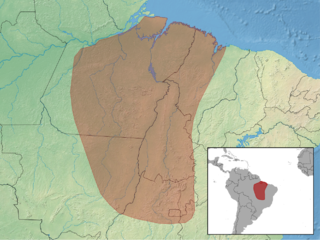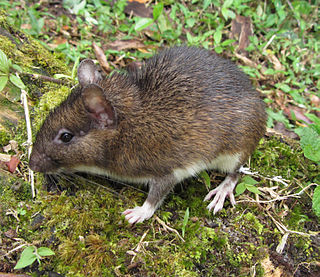The short-tailed spiny-rat, Proechimys brevicauda, or Huallaga spiny rat, is a spiny rat species from South America. It is found in Bolivia, Brazil, Colombia, Ecuador and Peru.
The Guyenne spiny-rat, Proechimys guyannensis, or Cayenne spiny rat, is a spiny rat species from South America. It is found in Brazil, Colombia, French Guiana, Guyana, Surinam and Venezuela.

The mouse-tailed Atlantic spiny-rat, Trinomys myosuros, is a spiny rat species from South America. It is found in Brazil.

Roberto's spiny-rat, Proechimys roberti, or Para spiny rat, is a spiny rat species from South America. It is found in Brazil.

The Napo spiny rat, Proechimys quadruplicatus, is a spiny rat species from South America. It is found in Brazil, Colombia, Ecuador, Peru and Venezuela.

Simons's spiny rat, Proechimys simonsi, is a spiny rat species from South America. It is found in Bolivia, Brazil, Colombia, Ecuador and Peru. It was named for American scientific collector Perry O. Simons.

The soft-spined Atlantic spiny-rat, Trinomys dimidiatus, is a spiny rat species from South America. It is endemic to Brazil.
Ihering's Atlantic spiny-rat or Ihering's spiny rat is a spiny rat species from South America. It is endemic to Brazil, and was named in honor of Hermann von Ihering.

The Atlantic spiny rats are all found in the genus Trinomys. They are a group of South American spiny-rats in the family Echimyidae.

The armored rat is a species of rodent in the family Echimyidae. It is monotypic within the genus Hoplomys. It is found in Latin America, from northern Honduras to northwest Ecuador. It possesses a range of spines on its back and sides of the body.
Makalata is a genus of rodents in the family Echimyidae.
The Colombian spiny-rat is a species of rodent in the family Echimyidae. It is found in Colombia and Venezuela.
The Pacific spiny rat is a species of rodent in the family Echimyidae. It is found in Ecuador and Peru.
The Guaira spiny-rat is a species of rodent in the family Echimyidae. It is endemic to Venezuela. It is commonly referred to as 'casiragua' to avoid confusion with true rats (Muroidea)
The Magdalena spiny rat is a species of rodent in the family Echimyidae. It is endemic to Colombia.
The Minca spiny rat is a species of rodent in the family Echimyidae. It is endemic to Colombia.
O'Connell's spiny-rat is a species of rodent in the family Echimyidae. It is endemic to Colombia.
The gray-footed spiny rat is a species of rodent in the family Echimyidae. It is found in Colombia and Venezuela.

The Sucre spiny-rat is a species of rodent in the family Echimyidae. It is endemic to Venezuela.

Echimyidae is the family of neotropical spiny rats and their fossil relatives. This is the most species-rich family of hystricognath rodents. It is probably also the most ecologically diverse, with members ranging from fully arboreal to terrestrial to fossorial to semiaquatic habits. They presently exist mainly in South America; three members of the family also range into Central America, and the hutias are found in the Greater Antilles in the Caribbean. Species of the extinct subfamily Heteropsomyinae formerly lived on Cuba, Hispaniola, and Puerto Rico in the Antilles, probably until the arrival of Europeans.









